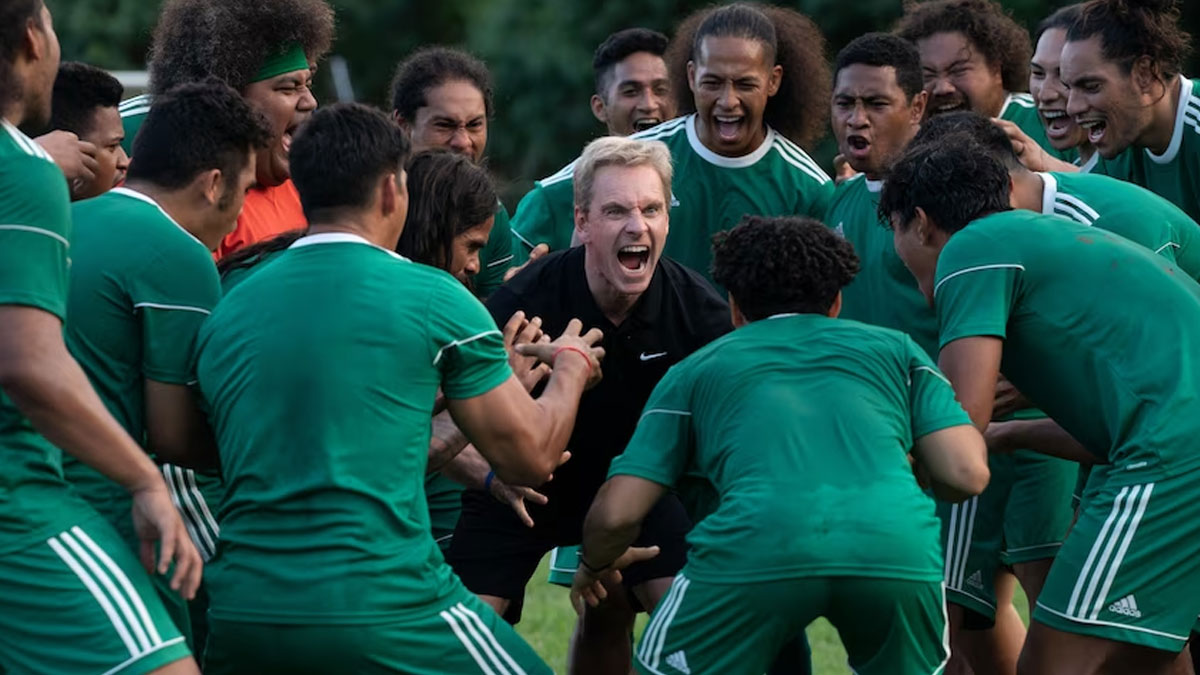
Taika Waititi loves an underdog story.
From stunted geeks and rebellious kids to goofball vampires, the Oscar-winning Māori filmmaker has routinely championed outcasts of all shapes and species. Even Asgardian deities find themselves cut down to size in Waititi's idiosyncratic cinema: When handed the keys to Marvel's cosmic sandbox, he memorably stranded Thor on a trash heap at the edge of the universe.
Like any former indie darling, the director's cultivated, carefree persona has also been defined by its outsider status — he felt like a renegade auteur who defied the odds.
But, recently, Waititi's career has merged into another narrative: that of the artist swallowed by the Hollywood machine.
Next Goal Wins is his latest tribute to the loveable losers of the world. A sports movie about the American Samoa soccer team — once considered to be the worst in the world — is the kind of lowkey, offbeat material that should've teed up an easy win for this director.
Taking after the 2014 documentary of the same name, the film introduces the audience to the ragtag team via their record-breaking 31-0 loss against Australia in 2001. After enduring a decade without a single win, the weathered team finds fresh hope with the arrival of Thomas Rongen, a washed-up Dutch American coach.
It's a remarkable true story that's summarily flattened into pure formula, its fictional retelling calibrated with calculated charm and flatlining wit.
The film's problems begin with its reluctant central character, played by Michael Fassbender (The Killer).
Having been banished from America's Major League, as well as his own marriage, Rongen carries a heavy chip on his shoulder.
"I'm not God, but I may as well be because I've performed more miracles than him," he tells the national team upon his introduction.
His attempts to whip the perpetual losers into shape fall short of that claim, and mostly consist of outbursts, eye-rolling platitudes and extensive references to The Karate Kid.
Like the rest of Rongen's self-pitying antics — which extend to incessant alcoholism and a blatant disregard for the island's customs — these beats are drolly played for laughs.
While Waititi's comedic style was once loose and unpredictable, it feels one-note here, never rising above a patter of self-deprecating jabs. Occasionally, the humour succeeds in its darker inflections (glimpsed in a drunk-driving sequence set to Sia's Chandelier).
The flimsy material makes a poor match for Fassbender's talents; he excels in roles that demand a steely intensity and gesture towards deeply suppressed emotion, not dead-eyed despondence and glib one-liners.
At least the supporting players are easy to root for. The film's biggest emotional swings centre on Jaiyah (newcomer Kaimana), the team's striker who identifies as fa'afafine, one of the four gender identities recognised in the Samoan diaspora.
Like her real-life counterpart, Jaiyah is the first openly transgender soccer player to compete in a World Cup qualifying match and is widely accepted by her community, though she's limited to the men's team under FIFA's medical standards.
Exuberant and tirelessly good-natured, she makes a fitting foil for the coach — but the film fumbles when it defines their relationship with tired tropes.
Unlike the real-life coach, Thomas is virulently transphobic: When introduced to Jaiyah, he immediately asks for her "real" registered name. He regularly picks on her across the movie, which escalates into an ugly confrontation when he goads her with her deadname.
Not only does Waititi handle transphobia with the infantilising morality of his 2019 film Jojo Rabbit, he blatantly models Thomas after Captain Klenzendorf, that film's alcoholic Hitler Youth leader who's gradually revealed to be a good-natured, closeted fool.
Waititi seemingly has too much affection for either spiralling man-child to confront them with their prejudices, offering the kind of easy catharsis that he aptly withheld in earlier work including Boy. In both recent films, this noncommittal approach renders hate crimes as functionally indistinguishable from quirk.
Next Goal Wins positions Jaiyah as the real hero of the movie and aims for positive trans representation, but unwittingly strips this character of dignity by simplifying her story into a frictionless, feel-good narrative.
Once the movie pivots away from Rongen's all-consuming dysfunction, it picks up some much-needed momentum to deliver a relatively straightforward sports drama. Those looking for peppy montages, the conquering of personal demons on the soccer pitch and rousing speeches delivered at half-time may well be satisfied.
It's still a resounding misstep from the director, who recently admitted to creative overcommitment (his extensive slate currently encompasses Klara and the Sun, two Charlie and the Chocolate Factory series and Star Wars, among other titles) and has described his relationship with cinema as "an arranged marriage".
It's no wonder Next Goal Wins feels like an unconvincing imitation of his previous films, which may have lacked polish but were unmistakably driven by an infectious passion.
Waititi's career reveals the faulty logic of the "one for them, one for me" filmmaking axiom, with his smaller passion projects becoming suffocated by the overlapping demands of IP-driven blockbusters and costly streaming TV shows.
Let's hope this losing streak doesn't last.
Story by: ABC Entertainment / By Jamie Tram
Original Story link: https://www.abc.net.au/news/2024-01-02/next-goal-wins-review-taika-waititi-american-samoan-soccer/103270868
Stay tuned for the latest news on our radio stations


